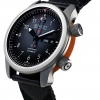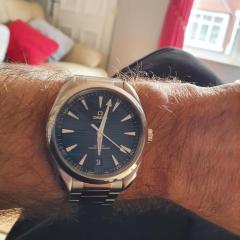Servicing Cost
-
Recently Browsing
- No registered users viewing this page.
-
Topics
-
Posts
-
it would be nice to have the exact model of the watch the or a picture so we can see exactly what you're talking about. this is because the definition of Swiss watch could be a variety of things and it be helpful if we could see exactly the watch your dealing with then in professional watch repair at least some professionals they do pre-cleaned watches. In other words the hands and dial come off and the entire movement assembled goes through a cleaning machine sometimes I think a shorter bath perhaps so everything is nice and clean for disassembly makes it easier to look for problems. Then other professionals don't like pre-cleaning because it basically obliterates the scene of the crime. Especially when dealing with vintage watches where you're looking for metal filings and problems that may visually go away with cleaning. Then usually super sticky lubrication isn't really a problem for disassembly and typically shouldn't be a problem on a pallet fork bridge because there shouldn't be any lubrication on the bridge at all as you typically do not oil the pallet fork pivots.
-
By Neverenoughwatches · Posted
A few things you should find out before you can mske a decision of what to do. As Richard said, what is the crown and all of the crown components made of . Then also the stem . The crown looks to have a steel washer that retains a gasket. So be careful with what chemicals you use to dissolve any stem adhesives or the use of heat. You might swell or melt the gasket unless you are prepared to change that also . The steel washer maybe reactive to alum. Something I've just used to dissolve a broken screw from a plate. First drilled out the centre of the screw with a 0.5mm carbide . Dipped only the section that held the broken screw in Rustins rust remover. This is 40 % phosphoric acid. 3 days and the screw remains were completely dissolved, no trace of steel in the brass threads. A black puddle left in the solution. -
I suppose this will add to the confusion I have a roller jewel assortment. It lists out American pocket watches for Elgin 18 size and even 16 size it's a 50. But not all the various companies used 50-50 does seem to be common one company had a 51 and the smallest is 43. American parts are always interesting? Francis Elgin for mainsprings will tell you the thickness of the spring other companies will not even though the spring for the same number could come in a variety of thicknesses. But if we actually had the model number of your watch we would find it probably makes a reference that the roller jewel came in different dimensions. So overlook the parts book we find that? So it appears to be 18 and 16 size would be the same sort of the arson different catalog numbers and as I said we don't have your Mongol know which Log number were supposed to be using. Variety of materials garnered her sapphire single or double but zero mention about diameters. Then in a section of rollers in this case rollers with jewels we do get this down in the notes section Roller specifications but of course zero reference to the jewel size. I was really hoping the roller jewel assortment would give us sizes it doesn't really. But it does show a picture of how one particular roller jewel gauge is used
-
By Neverenoughwatches · Posted
Seems to still do it through my mobile data, I use an android phone almost exclusively, but I'll double check it. Thanks mark Strange, I'll try my laptop that utilities edge. I've been on site half hour since I got home, it hasn't done it yet. Thanks John -
By RichardHarris123 · Posted
At work, I'm on MS Edge, not through chose, on my phone, chrome, no issues with either.
-







Recommended Posts
Join the conversation
You can post now and register later. If you have an account, sign in now to post with your account.
Note: Your post will require moderator approval before it will be visible.